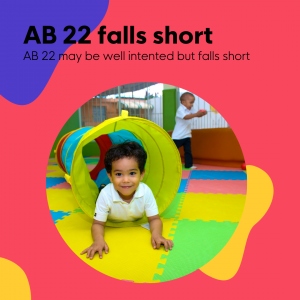May 18, 2021
AB 22 may be well intended, but falls short
By Susan Dumars
Transitional Kindergarten is a terrific option for many families. It is not the solution for all families. Unfortunately, the proposed legislation (AB 22) that expands TK across California, falls short for many families, communities across the state, and especially for childcare workers who kept our state functioning during the long year of COVID. While well-intentioned, this bill does not promote family choice and isn’t the solution to addressing the diverse needs of California families.
Perhaps the most prominent unintended consequence of this proposed legislation, is the potential creation of a divide between school districts and early learning professional, both of whom depend on successful collaboration to deliver the best care and learning for the children, families, and communities we serve. The teachers and administrators who work in Local Educational Agencies (LEAs), are dedicated to the children and families they serve. They see value in having children enter their schools earlier. Currently, families have choices to find the solutions that work best for them. AB 22 creates a coercive effect that pits LEAs against their partners in the childcare field, instead of taking a comprehensive view to support families in receiving the right care that serves their families’ needs. This bill would realign preschool programming and move funding from private providers to school districts. This shift would leave non-LEA providers with no or fewer funds therefore reducing the scope of care available for families. After a disproportionately hard year on childcare and early learning professionals – one that saw thousands of licensed centers in the U.S. close, many permanently, during the pandemic – this bill will inevitably result in further closures and workforce downsizing.
At the same time, this bill doesn’t seem to recognize that different families have different needs. Many families require care for their children before or after school, during school holidays, summers, or in-service days, which a TK program doesn’t provide. This forces families into a difficult decision of feeling they are told TK is the path they should be taking for their children vs. a need for more flexible comprehensive care options.
The National Association for the Education of Young Children (NAEYC) defines a mixed delivery early learning system as one that “includes services offered through a variety of programs and providers such as Head Start, licensed family, and center-based childcare, public schools, and community-based organizations supported with a combination of public and private funding.” Why does this matter? Because this holistic approach to early learning builds in comprehensive supports for families most in need and addresses a cross-section of needs that children require to be successful ranging from an expert approach to child nutrition to minimizing disruption to the child’s day. This bill threatens to remove important pieces of this mix, to the detriment of the kids themselves.
While it’s laudable to provide more options for families who wish to stream their children into the school system earlier, this bill doesn’t look at how developmentally appropriate the learning and socialization would be for very young children in this setting. When enrolled in a more traditional early learning environment, these children are working with professionals who are trained specifically on their development at this critical age.
The work in which childcare and early learning professionals engage is about education and care. In addition to developmentally appropriate care, childcare services mirror the traditional STEAM concepts in the K -12 world. Professional, licensed childcare provides families with the best of both worlds. Our industry is important to the families of this state, and instead of shifting resources away, California elected officials should double down on their support. The economic recovery in a post-COVID world depends on our ability to serve our families. This is no time to experiment with a change that would leave many families out in the cold, doesn’t serve the interests of children in need of developmentally appropriate care and learning, and threatens the livelihood and future of this vital industry. We strongly oppose AB 22 and suggest efforts refocus on meeting the comprehensive childcare and early learning needs of all California families.
